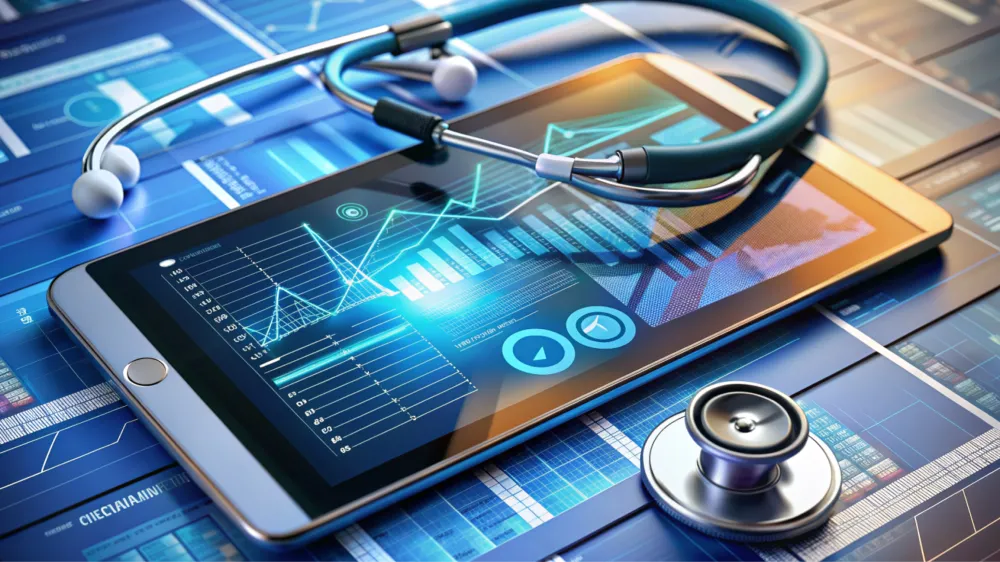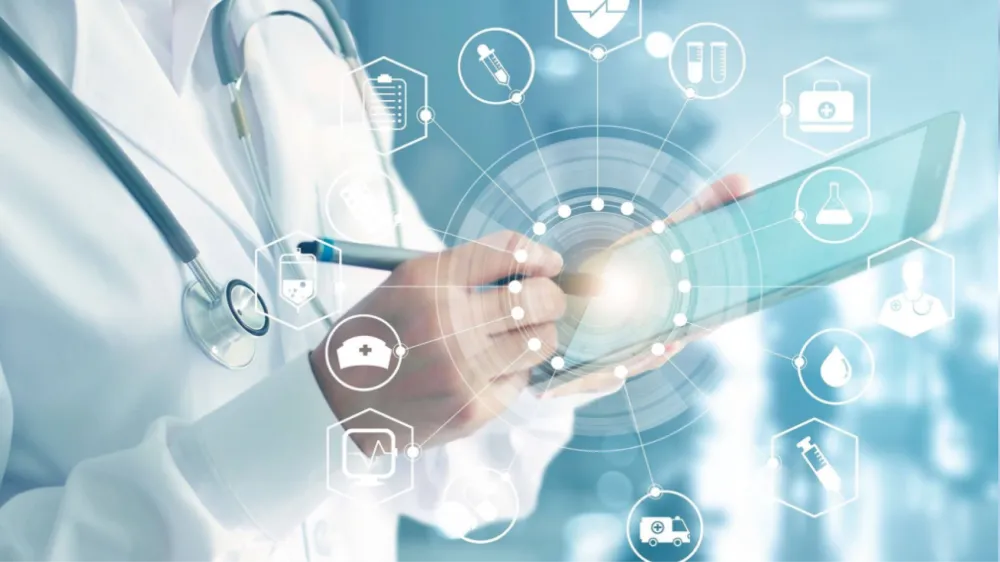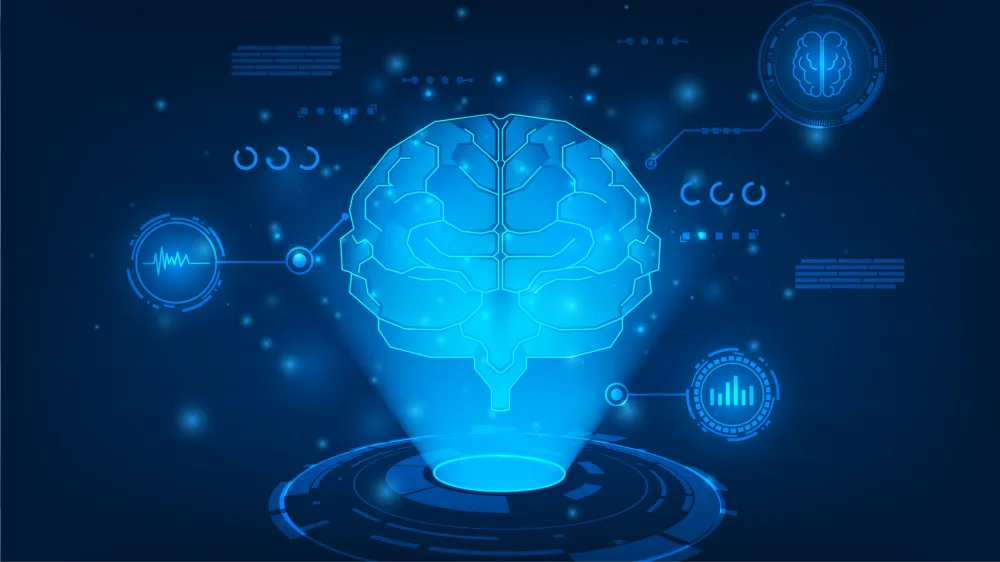Rising consumer centricity in U.S. healthcare tops the list of C-suite priorities, forcing organizations to adapt to higher care standards.
Data analytics in healthcare will play a prominent role in helping these organizations redefine themselves and engage consumers by streamlining the healthcare experience from beginning to end. This emerging technology is a way forward for the industry, from reshaping patient care to facilitating predictive modeling.
This article explores the meaning of data analytics and how data analytics in healthcare enhances clinical decision-making, optimizes operations, and improves patient experience.
What is Data Analytics in Healthcare?
Data analytics in healthcare analyzes and categorizes complex sets of healthcare-related data to identify trends, patterns, and insights and use the results to make more informed decisions.

This data can come from a variety of sources, including:
- Electronic health records
- Medicaid, Medicare, CHIP, and immunization programs
- TANF, SNAP, WIC, LIHEAP, and other state programs
- Laboratory test results
- Patient and provider surveys
- Medical and pharmacy insurance claims
- Social media and lifestyle data
Analytical tools and techniques like machine learning, artificial intelligence, and statistical analytics interpret the large volumes of data generated. By using business intelligence suites and data visualization tools, data analytics in healthcare helps healthcare professionals get data-driven information that can support better decision-making.
To ensure your analytical tools and technologies are deployed swiftly and effectively, KMS Healthcare’s Backlog Acceleration Service can help speed up your implementation process.

Different Types of Data Analytics in Healthcare
The modern healthcare industry captures data from across the continuum, which creates an explosion of medical data in healthcare systems. Understanding the different types of data analytics provides a clearer picture of how healthcare organizations should leverage data to improve patient experience and operational efficiency:
- Descriptive analytics
- Predictive analytics
- Prescriptive analytics
- Diagnostic analytics

1. Descriptive analytics
Descriptive analytics in healthcare involves analyzing data from historical to identify significant trends and patterns that can inform operations. This process includes examining and adjusting existing security measures to ensure patient data security, helping increase the quality of patient services. In cases where results align with predictive analytics, providers can proactively plan more effective patient care in the future.
2. Predictive analytics
Predictive analytics uses historical data and insights to forecast events in the healthcare sector. This method helps identify trends, predict needs, and identify patients at high risk or potential for hospital readmission.
As a result, healthcare providers can manage care and allocate resources more effectively. Moreover, predictive analytics also helps to quickly evaluate the effectiveness of diagnosis and treatment, allowing for timely adjustments and improving patient outcomes.
3. Prescriptive analytics
Predictive analytics improves data analysis by creating effective treatment plans and recommending actions to improve patient outcomes. Healthcare providers can use predictive analytics to recommend optimal treatment options, ensuring effective and personalized care
Additionally, the tool supports business decisions in healthcare organizations, improving operational efficiency and resource management. As a result, predictive analytics enhances patient care through personalized treatment plans and increases operational efficiency in healthcare organizations.
4. Diagnostic analytics
Diagnostic analytics digs into data to determine what happened, what will happen, and why. Diagnostic analytics provides insights into disease causes and health trends by looking at historical and real-time data. The analysis gives healthcare providers insights into past occurrences, future trends, and the underlying reasons for health trends and disease causes across time frames.
What are The Benefits of Data Analytics in Healthcare?
Data analytics in healthcare is changing everything, including how the industry operates:
| Goal | Traditional Care Model | Care Model with Data Analytics |
| Patient Centricity | Lack of provider integration, member data, channel data, etc., leads to operational silos. | Data interchange, exchange, and coordination allow for personalized care for patients. |
| Care Delivery | Fragmented and disjointed – redundancies and gaps in care. | Integrated, coordinated care across the continuum via proactive disease identification, mapping care program to patient and care management. |
| Accountability | No accountability for the care delivered. | Ability to incorporate pay-for-performance for care delivered. |

These substantial advancements illustrate the valuable benefits of healthcare analytics, including the ability to:
1. Improve the quality of care
Data analytics enhances the patient experience and empowers healthcare providers to make informed decisions that significantly improve care. By leveraging real-time and historical data insights, providers develop more effective, personalized treatment plans.
Additionally, data analytics supports healthcare organizations by optimizing operational efficiencies and resource allocation, ensuring prompt and effective care delivery. As a result, patients benefit from better treatment effectiveness and an overall positive healthcare experience.
2. Reduce cost
Data analytics in healthcare is a vital tool for cost reduction and efficiency improvement. By analyzing healthcare data sets, organizations can streamline processes and optimize resources, making healthcare services more affordable and accessible.
3. Minimize medical errors
Using advanced analytics solutions, organizations can reduce error rates, flag suspicious items for manual inspection, ensure timely detection and remediation, provide insights into risk factors, and help service providers be more vigilant and proactive. Data analytics also enhance healthcare delivery by efficiently managing services and preventing regulatory fines.
4. Enhance diagnostics and predictions
Data analytics powered by AI and machine learning enhance diagnostic accuracy and predictive capabilities, enable healthcare providers to predict diseases with greater precision, recommend essential confirmatory tests, and identify patients at high risk of experiencing adverse outcomes.
Learn more: The Power of Big Data Analytics in Healthcare: Top Benefits and Challenges.
What Are The Applications of Data Analytics in Healthcare?
Data analytics have just begun to transform healthcare. And already, the number of game-changing and life-changing applications is dizzying. Here are a few examples:
1. Healthcare Dashboards and Reports
Healthcare dashboards and reports aggregate data from multiple sources into a centralized dashboard, helping to manage patient care more effectively. Integrating administrative data helps healthcare providers quickly detect bottlenecks and implement effective solutions. Data analytics also improve healthcare efficiency, optimize resource allocation, and enhance patient outcomes.

2. Patient – Staffing Allocation
By analyzing hospital admission records and historical data, healthcare organizations determine patient demand patterns and predict future patient volumes. These insights help manage staffing schedules more effectively, ensure adequate coverage, and minimize unnecessary costs. As a result, operational efficiency improves, and patient care is enhanced through the strategic deployment of healthcare professionals to meet demand effectively.
3. Telemedicine
Data analytics has fueled the rise of telemedicine as a core driver behind consultation, diagnosis, and monitoring via video conferencing. Applying healthcare data analytics helps improve diagnosis and treatment planning based on patient profiles and previous disease trends. Healthcare providers can access data remotely to make the right decisions and provide personalized care.
Telemedicine powered by data analytics expands access to healthcare and allows for timely interventions, regardless of geographical location.
4. Electronic Health Records
Data analytics integrated into Electronic Health Records (EHR) improves healthcare delivery by using patient data to identify health trends and intervene preventively. Healthcare providers can rely on data analytics to effectively analyze EHR data such as medical history, test results, allergy information, etc., therefore identifying subtle patterns or emerging risks.
Integrating EHR and data analytics optimizes clinical decision-making, improves resource allocation, and promotes timely interventions, enhancing patient outcomes through proactive, data-driven healthcare strategies.
5. Early Detection of Chronic Diseases
Thanks to data analytics in healthcare, early detection of chronic diseases is becoming easier. By assessing relevant demographic and social factors, analyzing patient data helps healthcare providers identify individuals at higher risk due to age, lifestyle, and medical history.
The resulting data enables personalized treatment and prevention interventions that reduce hospitalization rates and prevent chronic disease progression. Early intervention helps effectively manage chronic disease, improve outcomes, and reduce healthcare costs.
6. Enhanced Security And Fraud Detection
Data analytics supports increased security and fraud detection in healthcare by detecting anomalies and deviations from historical medical data standards. Healthcare organizations use data analytics to continuously monitor suspicious activity, such as fraudulent claims or unauthorized access.
Optimizing data enhances data security, protects patient information, ensures compliance with regulatory requirements, and preserves the integrity and confidentiality of healthcare data.
7. Evaluating and Developing Practitioners
Data analytics collected from patient feedback has transformed medical evaluation and development, allowing healthcare organizations to identify professionals’ strengths and areas for improvement.
Insights from patient feedback program design, performance evaluation, and professional initiative development improved care quality. By continuously evaluating and evolving based on data, healthcare organizations can build a culture centered around offering patients the highest standards of care.
8. Advanced Medical Imaging Analysis
In healthcare, advanced medical imaging analysis utilizes data from scans to enhance diagnostic accuracy and efficiency by swiftly identifying abnormalities. Machine learning algorithms outperform humans in processing comprehensive data, detecting challenging disease manifestations, and supporting timely interventions.

By understanding the data, healthcare professionals can optimize resources, prioritize urgent cases, and facilitate more accurate clinical decisions and tailored treatments. Additionally, advanced medical imaging analysis accelerates research into advanced diagnostic and treatment methods.
FAQs
How do you choose the best healthcare data analytics platform?
To select the best healthcare data analytics platform, consider the following steps:
- Defining specific goals: Determine whether the goals are to monitor performance, identify trends, optimize processes, or support decision-making.
- Assess data sources: Ensure the platform can handle diverse data streams effectively, from electronic health records to wearable devices.
- Compare platforms: Based on their analytics capabilities, consider the support and training offered by each platform to facilitate seamless integration and ongoing use.
- Test the platform: Measure its impact on accuracy, timeliness, and actionability of insights. Solicit feedback from users to validate if the platform meets expectations.

These steps will ensure that the selected platform aligns with organizational goals and enhances decision-making processes in healthcare data analytics.
What are the essential healthcare KPIs to track?
In healthcare, tracking key performance indicators (KPIs) is critical to making informed decisions and improving patient outcomes and financial performance. Four essential types of healthcare KPIs include:
- Operational Efficiency: evaluates the operational efficiency of clinical operations and identifies bottlenecks in the patient care process to improve efficiency.
- Financial Growth KPIs: provide insight into financials and a comprehensive view of overall business performance.
- Patient Acquisition, Retention, and Engagement KPIs: measure the success of patient attraction and retention and evaluate marketing trends and patient engagement strategies.
- Internal Metrics: measure the efficiency and effectiveness of internal processes and employee or department performance. This allows organizations to adjust workflows and processes based on workforce capabilities and organizational goals and objectives.
Integrating data analytics enhances decision-making across healthcare operations, from clinical efficiency to financial management and patient engagement.
What is the future of healthcare data analytics?
The future of data analytics in healthcare will be the significant advancements seen over the next decade, thanks to the ubiquity of artificial intelligence (AI) and big data. AI will revolutionize how data is analyzed in healthcare, enhancing decision-making processes, particularly in drug interaction trials, where it can prevent harmful combinations and reduce costs.
Big data integration expands the scope, making it possible for healthcare organizations to manage larger amounts of data effectively. As technology evolves and consumer demand for personal healthcare increases, navigating a competitive landscape and data scalability is more important than ever.
Make Data Analytics Your Next Big Break with KMS Healthcare
Today’s most exciting opportunities in analytics go beyond using data to understand past performance. They also use information to generate insight into what will happen in the future – and even offer ways to introduce evidence-based actions to get the best outcome.
Healthcare providers need an expert third-party technology partner to harness big data analytics. KMS Healthcare is a global leader in healthcare technology, delivering exceptional healthcare software engineering solutions. Our skilled developers specialize in healthcare mobile apps, interoperability, and automated testing.
Need help with your next big data project? KMS offers expert resources to develop and integrate software for long-term success. Contact us today for a free project evaluation.
